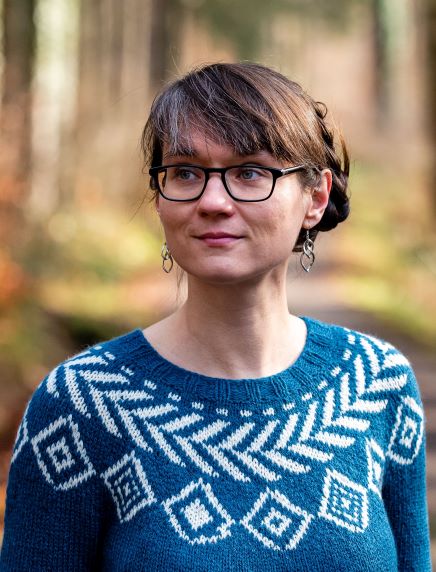2021 ISSP Research Mentors and Projects
Project Mentor TBA - The Assembly of Manitoba Chiefs
Wahbung 50 yr anniversary
This documentary will explore the traditions and history of the First Nations in Manitoba as nations and how that ancestral knowledge informed the cultures of the nations, and the unity which became a foundational strength for the First Nations regionally and nationally, and with impacts at the international level for Indigenous Peoples of the world.Oral history and archives will start the journey as we see and hear the land, the language and the intrinsic respect and reverence for the relationships between the people, the nations and the environment.
This 44 minute documentary will use a format that is driven by first-hand accounts of some of the key players, including the leadership, past and present, family member and community members who have participated in the historical and current extraordinary actions of the Manitoba Chiefs. Interviews will drive the story forward, enhanced by excerpts of archival/news footage and photographic exhibits from the past. There is a vast and disparate amount of information to be identified and reviewed for the documentary. There are few collections of material which speak to the historic and inner world of the First Nations leadership in Manitoba. First Nations in Manitoba have had 50+ years only to prepare to lead their citizens out of a colonized history, legislative framework, treaty violations into a future in which self-determination creates justice, health and security for First Nation citizens in every aspect of their lives, livelihoods and their governance. WABUNG spoke to these aims. There have been many, many leaders, nations in Manitoba who never waivered to voice their commitment to their people, to state to Canadians and their legislators that this inequity is perilous and shameful, and that the First Nations have no such room for a value system which does not honour its citizens, and though it may be antithetical to the colonial mind, that First Nation leaders in Manitoba would always hold fast to their cultural values, to their traditions, their people, the land, the water as inspiration for a country which embraces First Nations as central to the country.
The scholar for this project will collaborate with a team on the research project by:
- Attending virtual an introduction session, a meet and greet between Producer/writer and Research Lead, and subsequent sessions bi-weekly to discuss progress on activities;
- Work one-on-one with Producer – virtual or phonecall – to discuss intern’s skills, interests, possible activities for the research and production. Depending on the state of their project, they could be at the development stage or ready for production. The guidance could be connected to the creative elements, for example; help hone their voice, advice on their treatment, developing a shooting script, etc.;
- Research – archives, First Nations institutions – materials, compile research activities;
- Email check-in with Program Co-Leads after meetings;
- Attend Interviews of First Nation historians, Elders;
- Transcribe recorded interviews;
- Create schedules, lists;
- Production: duties may include travel to shoots/interviews, B-roll, assist Camera Crew, or assist Director;
- Post-production may include graphic design skills (not necessary), production assistant role – taking notes, general assistant duties for = Director and Editor in the edit process.
Debbie Reid is mentoring Tracey Clearsky.
Centre for Research in Young People's Texts and Cultures
Six Seasons of the Asiniskaw Ithiniwak
I am a postdoctoral fellow for the Six Seasons of the Asiniskaw Ithiniwak project.
The overall goal of this SSHRC Partnership project is to move forward the ongoing work of reclaiming Indigenous languages, histories, and knowledges among the Asiniskaw Īthiniwak (Rocky Cree), work that is taking place now in the context of the calls to action by the Truth and Reconciliation Commission of Canada (2015) for, among many other things, the revitalization of Indigenous cultures, the “relearning of Canada’s national history,” and the reconciliation between Indigenous and non-Indigenous people.
Six Seasons of the Asiniskaw Ithiniwak Project
As a postdoctoral researcher for the Six Seasons project, I center the following question in my work: how can stories and storytelling be utilized to empower Indigenous communities and individuals, while also avoiding harm?
My work in this area falls under three different categories:
- Providing Resources for Community Creative Projects
With the assistance of the Six Seasons project's Story Team members, I consult with Rocky Cree storytellers, writers and Knowledge Keepers to help them realize their creative projects. I help to create picture books that reflect the vision of the Rocky Cree storytellers and Knowledge Keepers, based upon recordings of their stories. - Preserving and Sharing Rocky Cree Oral Stories
I help with recording, preserving, and organizing stories told by Rocky Cree storytellers and Knowledge Keepers. - Reflecting on the Practice of Rocky Cree Storytelling Today
By studying the stories as well as consulting with Rocky Cree community members and the academic team members of the Six Seasons project, I attempt to gain an understanding of the variety and complexity of Rocky Cree stories today. What is the work that stories do for community empowerment today? Are there stories that can cause harm, and if so, how can this harm be avoided or minimized? What happens when stories are told in different media or different languages?
The Summer Scholar will be involved in my work with Cree storytelling and will be given the opportunity to learn about Rocky Cree stories, oral history theory and practice, and Indigenous methodologies as they relate to community-based research and the archiving of oral stories. The Scholar will be involved in community-based research and gain experience in collecting and transcribing oral stories, and they would be given the opportunity to work with me on thinking about the ethics and protocols around preserving and archiving oral stories.
Furthermore, the Scholar will be involved in the work of translating oral stories into picture books for children and they will be given the chance to explore creative and theoretical questions around this endeavor.
Finally, the Scholar would be given the opportunity to be a part of a small collaborative research team consisting of myself and my two project supervisors, William Dumas (Rocky Cree Elder and storyteller) and Dr. Warren Cariou (University of Manitoba). When attending team meetings, the Scholar will be given a chance to listen, learn, and participate.
More information on this project can be found here: Six Seasons Project
Dr. Braith is mentoring Krystalyn Dyck
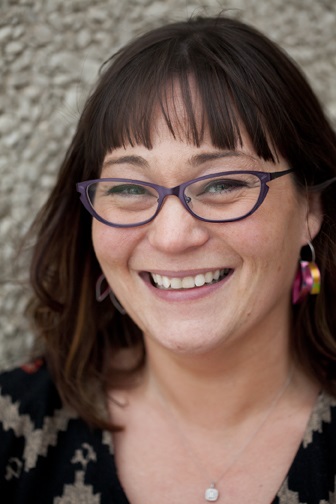 Dr. Jaime Cidro - Anthropology / Indigenous Development
Dr. Jaime Cidro - Anthropology / Indigenous Development
Dr. Cidro is the lead on a project that focuses on supporting Indigenous community organizations in taking the lead in establishing their own research priorities and developing and supporting research platforms. The Network Environment for Indigenous Health Research (NEIHR) is funded through the Canadian Institute for Health Research. This project works closely with partner organizations such as the First Nations Health and Social Secretariat of Manitoba (FNHSSM), the Manitoba Association for Friendship Centres (MAC), the Manitoba Inuit Association (MIA), and Aboriginal Youth Opportunities (AYO) to help increase research capacity and ensure that Indigenous partners are leading the research process.
She Walks with Me: Supporting Urban Indigenous Expectant Mothers through Culturally-Based Doulas
Dr. Cidro's projectis a five-year project working for the research and delivery of an Urban Indigenous Doula service in Winnipeg to improve health outcomes for Indigenous mothers and their babies residing in the city. This project will be the first urban Indigenous doula research project that focuses on urban Indigenous women and families in Canada, and will investigate models of service delivery and pilot test a model which will have applicability to other cities and centres across Canada and will inform organizations, decision-makers, and policy development to improve the experiences and wellness of Indigenous women and families in pregnancy, birth, and post-partum. This project was initiated by Indigenous partners and will be carried out with those Indigenous partners and collaborators as the leads. The goal of the project is to develop a large urban Indigenous doula research program that includes an appropriate service delivery model and collects mixed methods data for evaluation that is responsive to the needs of the urban Indigenous community, to be housed by the Aboriginal Health and Wellness Centre in Winnipeg. The two objectives which will meet this goal includes: (1) to establish a service delivery model for urban Indigenous doulas that places Indigenous communities and organizations at the centre and provides administrative, technical, cultural, and emotional support for Indigenous birth workers, and (2) to develop, pilot, and evaluate an urban-focused Indigenous doula program, alongside stakeholders, that supports women.
The scholar is expected to work with the research team and partners to undertake the articulation of a service delivery model. There are two activities that will be undertaken:
- Work on the second phase of an environmental scan to find details on their administrative mechanisms such as training and fee payment structures by conducting phone interviews.
- Assist with the development of an evaluation framework for the project.
- Assist with the development of a service delivery model in Winnipeg for urban Indigenous doulas by participating in research team meetings with partner organizations (health and social service agencies).
To learn more about Dr. Cidro's research, please read the article below:
Urban Indigenous Doula Project Receives CIHR Funding
Dr. Cidro is mentoring Amber Balan.
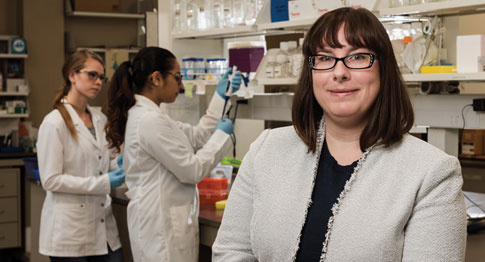 Dr.Renée Douville - Biology
Dr.Renée Douville - Biology
Dr. Renée Douville's research focus is the study of endogenous retroviruses found within the human genome. Her training includes a PhD in Immunology at the University of Manitoba, a postdoctoral fellowship in Neurology at Johns Hopkins University and a second postdoctoral fellowship in immunity against retroviruses at McGill University.
Douville's RetroFIND laboratory studies neurological conditions associated with endogenous retrovirus activity, specifically Amyotrophic Lateral Sclerosis (ALS) and schizophrenia. The goal of the lab is to understand how these viruses impact human health and identify therapeutics that prevent virus-triggered cell damage.
Identification and immunologic presentation of COVID-19 cross-reactive epitopes
COVID-19 can lead to long-term neurological complications in select individuals. COVID-19 viral proteins share immunologic epitopes with human proteins and the microbiome. Molecular mimicry through cross-reactive proteins is known to drive pathological mechanisms in several neurological diseases. Preliminary evidence from the Douville lab suggests that only individuals carrying select major histocompatibility complex (MHC) alleles may be able present these cross-reactive peptides to the immune system. This project will involve performing computational biology analyses to predict COVID-19 cross reactive epitopes and identifying the MHC alleles that can present them.
To learn more about Dr. Douville's research, please visit:
Dr. Douville is mentoring Felicia Sinclair
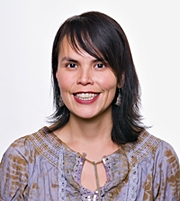 Dr. Lorena Fontaine -Indigenous Studies
Dr. Lorena Fontaine -Indigenous Studies
Lorena Sekwan Fontaine is the Indigenous Academic Lead and an Associate Professor in Indigenous Studies. She is also the co-director of the Thematic Major in Indigenous Languages at the University of Winnipeg. Currently, Dr. Fontaine is workingwith Indigenous Languages of Manitoba on a pilot program to assist fluent Indigenous language speakers teach Indigenous languages toadult learners as an additional language. Her research includes linguicide, the legacy of the residential schools and Indigenous language rights in Canada.
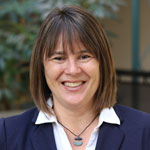 Dr. Shelley Tulloch - Anthropology
Dr. Shelley Tulloch - Anthropology
Shelley Tulloch is a Professor and Chair of the Anthropology Department and the co-chair of the Thematic Major in Indigenous Languages at the University of Winnipeg. She also works closely with Inuit organizations and communities on research related to culturally-relevant education; Indigenous leadership; Indigenous youth; bilingualism; language revitalization; and identity. Her research is funded by Inuit governments, SSHRC and ArcticNet Centre for Research Excellence.
The scholar will assist Dr. Fontaine and Dr. Tulloch with a literature review on promising practices in Indigenous language teaching and assessment as well developing a program evaluation format for the Thematic Major in Indigenous Languages. The program evaluation will assist Dr. Fontaine and Tulloch with tracking the language program to ensure it is meeting the objectives in addition to tracking the impact on the students and the broader academic/Indigenous language revitalization community.
To learn more about Dr. Fontaine's research, please visit:
Educational Ojibwe radio drama to hit the airwaves in 2021
To learn more about Dr. Tulloch's research, please watch:
Dr. Fontaine and Dr. Tulloch are mentoring Verna Cowley.
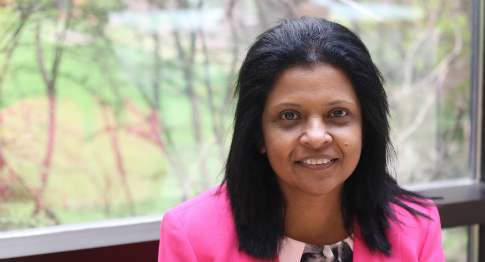 Dr.Darshani Kumaragamage - Environmental Studies & Sciences
Dr.Darshani Kumaragamage - Environmental Studies & Sciences
Dr. Darshani Kumaragamage has a BSc Honors degree in Agriculture and a PhD in Soil Science with over 30 years of experience in teaching at the University level.
Kumaragamage's research program at The University of Winnipeg focuses on the environmental impact of agricultural practices.
Her research interests include environmental impact of using synthetic fertilizers and animal manure as plant nutrient sources, transformations and mobility of phosphorus in soils and nutrient management for increased productivity.
Use of soil amendments to reduce phosphorus release to floodwater from waterlogged soils in Manitoba
Phosphorus is a major water pollutant, and its presence can impair water quality through stimulating algal growth in freshwater bodies. Toxic algal blooms in water bodies can harm fish and other aquatic organisms as seen in Lake Winnipeg. Phosphorus losses from agricultural soils contribute to phosphorus loading to water bodies. In Manitoba, most farmlands are poorly drained during the snowmelt period which enhance phosphorus losses from soils. We are presently conducting a field-based trial to evaluate soil amendments in reducing phosphorus release to floodwater from flooded soils during spring snowmelt period. The field trials have been set up in two fields in the Red River Basin (Morris, MB and Randolph, MB) that are prone to flooding and identified as hot spots by the Lake Winnipeg Foundation. In consultation with the landowners, we selected a low-lying area close to a drainage ditch in each field to layout the experimental plots. Each site has experimental subplots with four treatments (unamended and three amended treatments) and four replicates. Amendments (gypsum, alum or magnesium sulfate) were applied to the surface of soils in plots receiving amended treatments in the fall 2020. Representative soil samples from each plot were collected in November 2020 and stored in a cooler, and will be analyzed for available phosphorus. During the spring snowmelt period in 2021, we plan to collect floodwater runoff samples daily and the daily volume of melt will be measured. The runoff samples will be immediately analyzed for dissolved reactive phosphorus. Collection of samples will continue for the duration of the spring flood period. At the end of the snowmelt flooding, a soil sample will be taken from each plot and will be analyzed for available phosphorus.
The scholar will be help with soil sample collection and runoff sample collection in the field and help in analysis of soil and water samples for phosphorus in the laboratory. The scholar will compare the effect of different amendments in reducing the available phosphorus in soils, and examine the relationship between available phosphorus in soil and the phosphorus concentration in floodwater.
The scholar will be working closely with a large research team consisting of Professors (Environmental Studies and Sciences, Geography and Chemistry Departments at UW, and Soil Science Department at UM), Post doctoral fellows, graduate and undergraduate students from UW, Scientists from Agriculture and Agri-Food Canada and Lake Winnipeg Foundation, personal from Seine-Rat River conservation district and HyLife, as well as farmers. The student will be trained in sampling of soil and water and analysis of available phosphorus in soil and dissolved reactive phosphorus in water samples.
To learn more about Dr. Kumaragamage's research, please read the article below:
Reducing Phosphorus in Waterways
Dr. Kumaragamage is mentoring Kirsten Corbett-Constant.
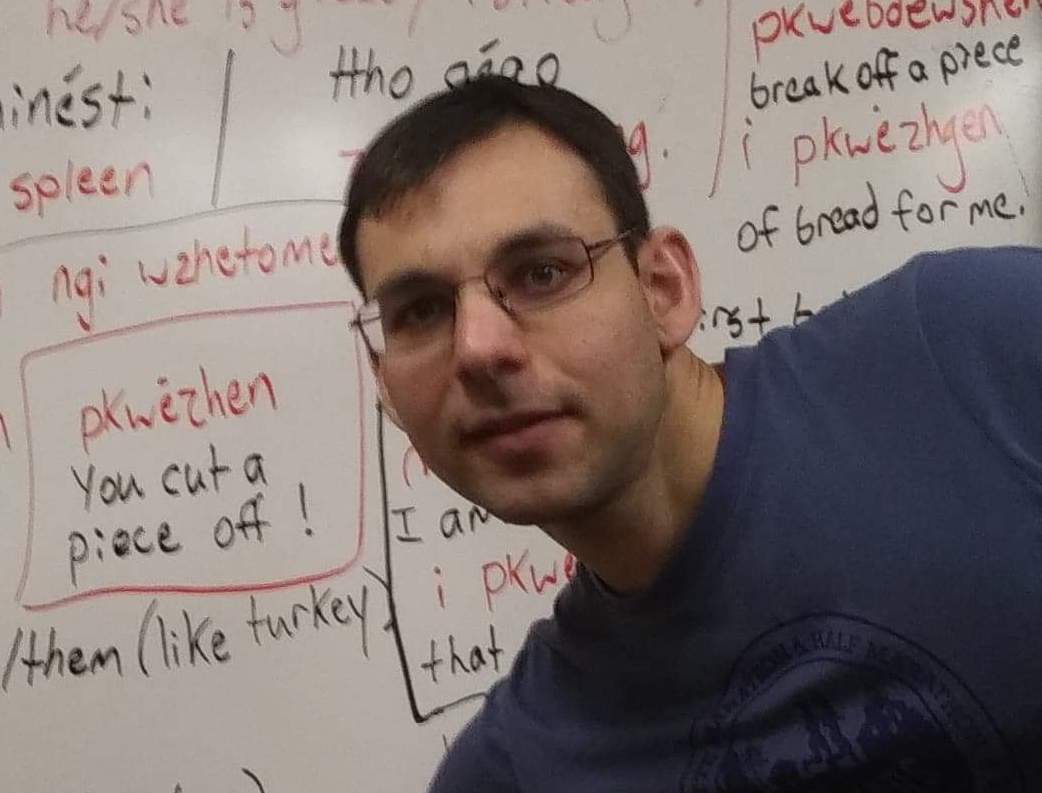 Dr. Robert Lewis - Anthropology
Dr. Robert Lewis - Anthropology
Dr. Robert Lewis is Assistant Professor in the Department of Anthropology. Robert is a linguist whose research focuses on understanding discourse related phenomena in the Algonquian languages, as well as developing and improving methods to teach the Algonquian languages. Robert helped to teach the Potawatomi language for a few years before joining The University of Winnipeg.
Algonquian Interjections Project
The goal of this project is to make it easier for teachers of Algonquian languages to teach one part of their language — interjections. Interjections are words that express a speaker’s internal state, express something to a listener, or express a comment. For example, interjections in English are words like “ouch,” “pst,” “yuck,” among others. There are three main activities the scholar will undertake:
1. Make a comparative list for the family
This project will identify the interjections in the thirty languages that make up the Algonquian language family (Cree, Ojibwe, Oji-Cree, Potawatomi, etc.) by surveying the interjections used in each of the languages from published materials. The findings from the survey will be used to make a comparative list.
2. Understand the interjections
This project will identify how interjections are categorized in the Algonquian languages in terms of their meanings and contexts of use. The list will also include information such as meaning(s) and appropriate context of use. This list will establish how much overlap and variation in interjections there are in the Algonquian language family. The findings will tell how much historical contact of Algonquian languages have had amongst themselves.
3. Facilitate the teaching of interjections
The list that this project creates needs to be accessible and meaningful to teachers of Algonquian languages. This project will redesign the comparative list as a resources for teachers of the Algonquian languages. The list will become a reference source for teacher to quickly find examples of interjections in context that can be brought into their language classes.
The scholar will help search through grammars of Algonguian languages and published materials in Algonquian languages to locate various interjections. The scholar will add these interjections to a master list of interjections in Algonquian languages by language. The scholar will report on the contexts of use and obstacles to identifying these contexts. This work will primarily require library and literature searches and the co-creation of a list with the researcher. Scholars with knowledge of an Algonquian language are encouraged to apply.
The scholar will have an opportunity to report on the finding at conferences and participate in the co-writing of teaching materials for instructors.
Dr. Lewis is mentoring Megan Lindell.
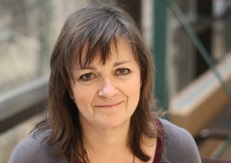 Dr. Shauna MacKinnon - Urban and Inner-City Studies
Dr. Shauna MacKinnon - Urban and Inner-City Studies
Dr. MacKinnon is Associate Professor and Chair of the Department of Urban and Inner-City studies. She has conducted research on social and economic issues for over 20 years with a focus on public policy, poverty and inequality. Dr. MacKinnon is most interested in research that focuses on issues identified by individuals living in poverty and those working closely with them.
Dr. MacKinnon subscribes to a social justice, community-based participatory research approach to research, actively engaging with community partners beyond research, to mobilize knowledge and use research as a tool to advocate for progressive change.
The Post-secondary Transition Experiences of CEDA Pathways Graduates
The CEDA Pathways program provides supports to promote high school graduation in Winnipeg’s North End. While its success rate is high, relatively few of the graduates continue on to complete post-secondary education programs. A high number of CEDA Pathways student are Indigenous and newcomer youth who face many barriers during their educational journeys. This longitudinal participatory community-based research project seeks to learn more about the post-secondary transition experiences of graduates of the CEDA Pathways program. The main focus will be qualitative, involving interviews and sharing circles with CEDA Pathways graduates. The project aims to identify the barriers experienced by students to inform the development of appropriate programs necessary to support inner-city students in post-secondary programs.
The student scholar will participate in the first phase of the research process. This will include contributing to the literature review on post-secondary transition programs for Indigenous, newcomer and other multi-barriered students. They will work with a research team to develop research instruments and if time permits, they will participate in the initial stages of data collection.
To read more about Dr. MacKinnon's research, please visit the article below:
UWinnipegger gets $2.5 Million Research Grant
Dr. MacKinnon is menotoring Karen Jonasson.
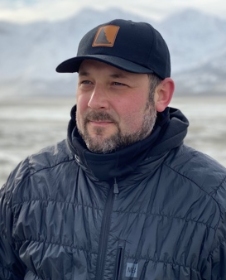 Dr. Ian Mauro - Prairie Climate Centre
Dr. Ian Mauro - Prairie Climate Centre
Ian Mauro is the Executive Director of the Prairie Climate Centre and an Associate Professor in the Department of Geography at the University of Winnipeg. He is an environmental scientist, geographer, and filmmaker and his research focuses on the linkages between science and storytelling, specifically regarding climate, environment and social change issues.
Listening, Leadership, and Land: Métis Climate Perspectives, Knowledges, and Experiences
Over the past few years, the Métis National Council has been collaborating with the University of Winnipeg’s Prairie Climate Centre (PCC) to develop research, tools, and outreach that better understand and communicate the unique, timely, and critically important perspectives, knowledges, and experiences of Métis people regarding conservation and climate change. Through this partnership, have developed videos on Métis perspectives regarding climate change, as well as preliminary research and writing that will inform an article on the PCC’s Climate Atlas of Canada (www.climateatlas.ca). Building on this momentum, the MNC and PCC have continued this collaboration, and to further expand research and communication efforts across MNC’s conservation and climate change programs. More specifically, this project is designed:
- To better understand and document Métis knowledge regarding conservation and climate through a mix of literature review, oral history, and filmmaking approaches;
- To create and share engaging resources that communicate Métis perspectives and experiences with broader audiences of Métis and non-Métis people alike;
- To support Métis communities as they consider the climate impacts and associated adaptation and resiliency measures they can implement to increase safety; and
- To increase capacity within Métis communities -- specifically amongst youth -- to conduct research and practice diverse forms of storytelling and knowledge exchange;
The scholar will be part of a team conducting research related to Métis knowledge and perspectives on climate change. Responsibilities may include:
Literature review and summary of Metis knowledge on climate change;
Assistance in coordinating, logging, and transcribing interviews with Métis Knowledge Keepers and community members;
Support the writing plain language article(s) on Metis knowledge on climate change; and
Support video production (e.g. editing, community outreach and approvals, etc).
To learn more about Dr. Mauro's research, please read:
David Suzuki and Ian Mauro to tour ‘Beyond Climate’ in BC
Dr. Mauro is mentoring Joelle Jobin.
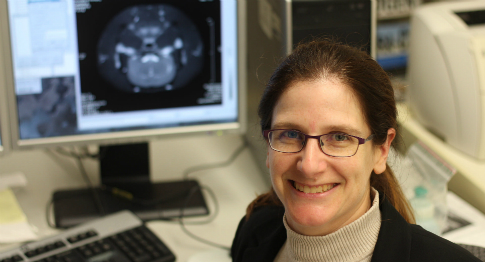 Dr. Melanie Martin - Physics
Dr. Melanie Martin - Physics
Dr. Melanie Martin holds a BSc (Hons) from the University of Manitoba, and two masters degrees and a PhD from Yale University. She was a postdoctoral scholar and an associate scientist at Caltech in Pasadena, California, before she returned to Winnipeg in 2004. She is now a professor of physics at The University of Winnipeg and director of the Magnetic Resonance Microscopy Centre.
Martin’s research specialty is the development of non-invasive magnetic resonance imaging (MRI) methods to diagnose and understand central nervous system diseases. Most recently, she developed an MRI technique with the highest resolution to date.
Martin serves on many international and national society committees. She has also served on grant selection committees for numerous international, national, provincial and local agencies.
Measuring Axon Diameters in the Mouse Brain
Axons are part of nerve cells. The density and diameter of axons in the brain are thought to change with disease. There is no non-invasive way to measure the density and diameter of axons so the relationship between differences in axon sizes and diseases is unknown. I have created a non-invasive method to detect the density and diameter of axons in the brain using magnetic resonance imaging (MRI). In this project, the student will optimize the method so we can begin to study the variations in axons in brains.
The scholar will collect data using UWinnipeg’s 7T MRI machine. The student will analyze the data using custom-built Matlab programs. The student will write-up their results for publications and presentations.
To learn more about Dr. Melanie Martin's research, please read the article below:
UWinnipeg Researcher Working to Improve Brain Imaging
Dr. Martin is mentoring Ashley King.
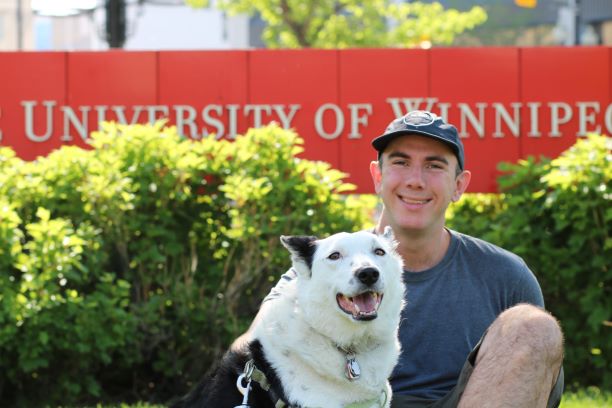 Dr. Matt Morison - Geography
Dr. Matt Morison - Geography
Dr. Matt Morison holds a BSc from the University of Winnipeg, and a PhD from University of Waterloo. In addition to occasional teaching positions at the University of Manitoba, he is currently a postdoctoral fellow at the International Institute for Sustainable Development-Experimental Lakes Area and University of Winnipeg, having returned to Winnipeg in 2018.
Morison’s research specialty is the use of laboratory, field, and novel analytical methods to understand how natural ecosystems function with regards to water movement, nutrient cycling, and carbon storage – but also how disturbance (climate change, permafrost thaw, agriculture, forest fire, and industrial development) impact these natural processes.
Linking Carbon Cycling and Water Movement in the Boreal Shield
In order to better understand the role of the earth’s vast forested area in our carbon budget, we need to find ways to monitor ‘hot spots’ of carbon activity – the boundaries between wet and dry, boundaries between watersheds and lakes. Working collaboratively with the International Institute for Sustainable Development-Experimental Lakes Area within their long-term mission to conduct watershed research at whole ecosystem level, we will investigate carbon storage and movement in a representative forested landscape using novel measurements strategies and techniques. The results of this work will have important implications for understanding how forested watersheds can be accounted for in global carbon budgets and how they are affected by, and also affect, rates of climate change.
The scholar can expect to work within a the larger research team on a variety of tasks and receive training in a number of relevant laboratory- and field-based techniques, primarily focused on their personal summer research project. This will involve some opportunities to complete fieldwork at the International Institute for Sustainable Development - Experimental Lakes Area, including installing and monitoring of sensors, soil and water sampling, and analysis of soil and water samples for carbon content and physical properties, all pending public health protocols. A number of contingencies relevant to public health orders surrounding Covid-19 exist to ensure that, under a range of possible different scenarios, there will be ample opportunity for the Scholar position to carry out novel research for the proposed project. In the event that any trips to the field site are not possible, the project has the potential to be shifted to a laboratory-based experimental protocol, or continuing an existing research project aggregating long-term ecological research data.
To learn more about Dr. Morison's research, please read the article below:
UWinnipeg Postdoc to Explore Climate Change in the Boreal Forest
Dr. Morison is mentoring Bailey Pavcek.
 Dr. Jacques Tardif - Biology / Environmental Studies and Sciences
Dr. Jacques Tardif - Biology / Environmental Studies and Sciences
Dr. Jacques Tardif has been studying the boreal forests of Manitoba since 1998. Tardif is a forest historian who uses tree rings to better understand tree growth, forest disturbances and climate interactions in central Canada.
He uses tree-ring measurements and tree-ring anomalies to reconstruct environmental events (cool summers, late spring frosts, insect outbreaks) that took place over the last two to three centuries. Tree-ring analysis provides a long-term perspective when analyzing recent environmental changes.
Tree growth and environmental influences at the University of Winnipeg DendroEcology Laboratory (UWDEL)
Our research deals with trees and how they respond to their environment and, in particular, to extreme climatic or hydrological events like late spring frosts, extreme spring floods, cool or dry summers, etc. We work mainly with wood and, in particular, with tree-rings characteristics including ring width, cell size, wood chemistry, etc. Each year, trees in Canada are producing a tree ring reflecting the growing conditions to which they were exposed. Once we have established the relationship between existing tree-ring characteristics and their environmental trigger, we can use tree rings as environmental proxies. To do so, we need to crossdate samples from many trees in an area to ascertain the year in which each tree ring was produced. This is called crossdating. Currently we are looking at the impact of spring floods on riparian trees and how tree-ring anatomy (especially vessels) is affected during major flood events. We are also looking at reconstructing past late spring frost events in Manitoba by identifying frost rings in tree samples. Late spring frost will usually kill some living cells in trees and we can identify and date them looking at wood samples. The successful student will be introduced to and getting practical training related to the preparation of wood samples for tree-ring analysis, the process of crossdating and in the identification of tree-ring anomalies associated with either spring flooding or late spring frost.
The selected candidate will learn the abc of dendrochronology. He-she will learn how to collect quality cores from tree (if covid situation allows for it). The applicant will prepare wood samples for tree-ring analyses (mounting, sanding, etc.). He-she will be involved in processing samples from northwestern Manitoba. Pointer years (characteristic rings) will be identified using a stereo-microscope and apply toward crossdating. Crossdating is the most important principle in dendrochronology. It assure that each tree ring is assigned its exact year of formation. It involves careful matching of pointer years between samples from the same tree and among trees from same site. The candidate will also learn how to measure tree-ring width and will be participating in a research project dealing with frost rings. Frost rings are indicative of subfreezing temperatures occurring during the growing season. Their position within a tree ring (early or late) provide information regarding the timing of the extreme climate events. The candidate will be working with various coniferous species and will be identifying and compiling these tree-ring anomalies. Bark measurements may be indicated. Tree age will also be determined. The objective of the project is to determine the importance of late spring frosts in northwestern Manitoba using multiple tree species. Basic articles about tree-ring methodology and its application to frost rings will be provided.
To learn more about Dr. Tardif's research, please read the article below:
Dr. Tardif is mentoring Sydney Coutu.
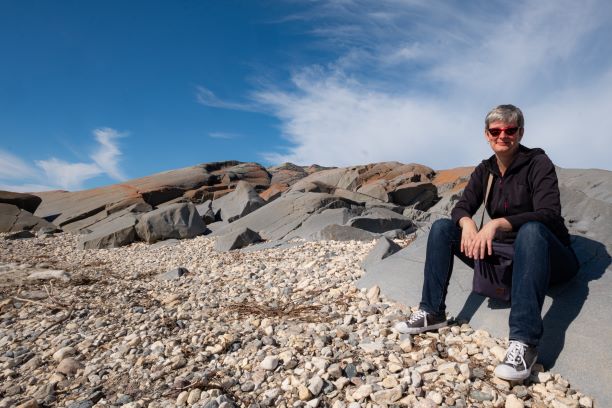 Dr. Janis Thiessen - History
Dr. Janis Thiessen - History
Dr. Thiessen is Professor of History and Graduate Chair of the Joint Master’s Program in History. She is principal investigator of the Manitoba Food History Project, working with research collaborators Prof. Kimberley Moore and Prof. Kent Davies (UW Oral History Centre) and partnering with UW’s Diversity Food Services and Winnipeg Public Library.
The Manitoba Food History Project
The Manitoba Food History Project is driven by two research questions: How has food been produced, purchased, and consumed in Manitoba? And how have those processes changed over time? We document and interpret the history of food production, retailing, and consumption in Manitoba. Outcomes of this SSHRC-funded project include oral histories, ArcGIS Story Maps, and a podcast series (“Preserves”). The Manitoba Food History Truck (in partnership with UW’s Diversity Foods) travels the province, inviting Manitobans to cook local, historical, meaningful recipes aboard the truck while students and project members conduct oral history interviews with them. Additional oral history interviews are conducted off the truck, in food-related businesses. These oral histories contribute to our understanding of the business, labour, ethnic, Indigenous, and local histories of the province.
The scholar will be trained in oral history research by the faculty member with the assistance of the UW’s Oral History Centre. The scholar will prepare oral history interviews for archival deposit (logs, summaries, metadata, etc.) and if possible, conduct and/or assist in oral history interviews on and/or off the Manitoba Food History truck.
To learn more about Dr. Thiessen's research, please read the article below:
Manitoba Food History Project Trucking Along Remotely
Dr. Thiessen is mentoring Alyssa Czemerynski.
To return to the ISSP homepage, please click here.

